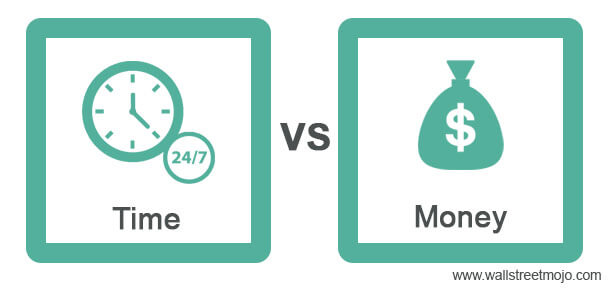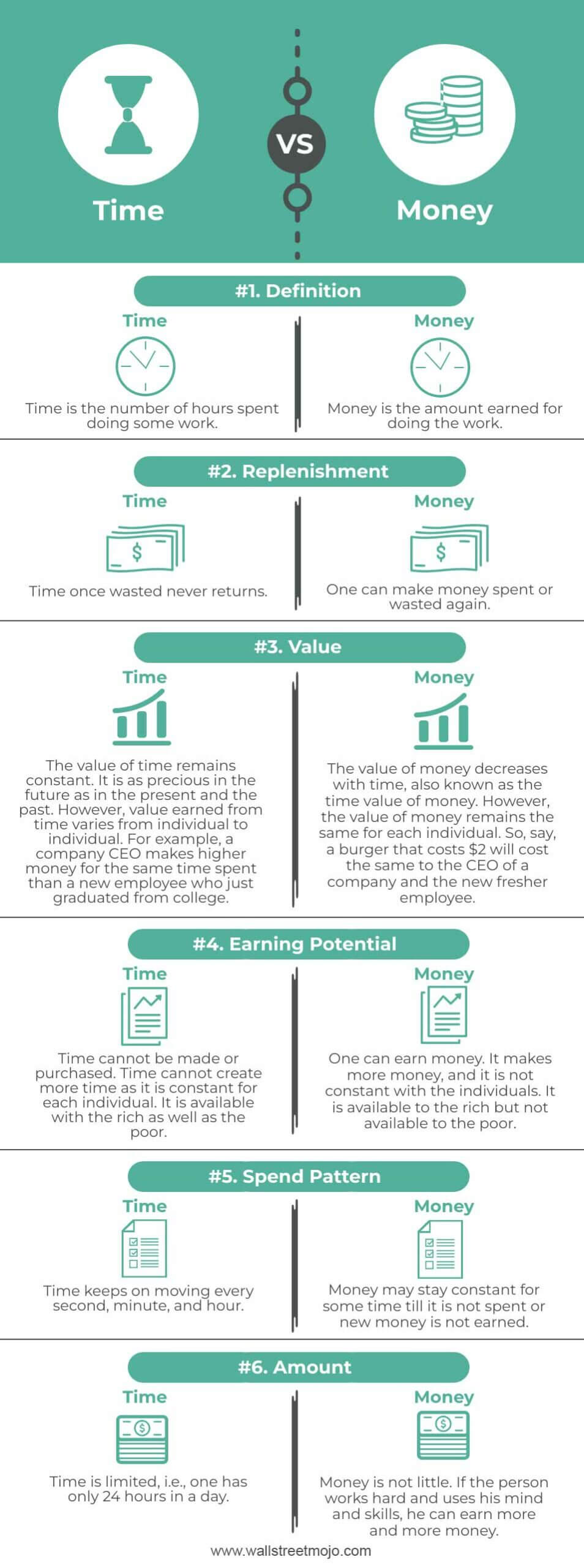Difference Between Time vs Money
There is an age-old saying that ‘Time is Money.’ It is true as the company pays its employees for the time. They spend time in the office working for them. However, is it worth the money they are paid for the time they spend? That brings us to the concept of comparing time vs. money.
Time and money are inversely related. More the time spent the more money earned. If someone wastes time, he wastes or loses the opportunity to make more. However, the time invested is similar to the capital invested.
Time and money are valuableTime And Money Are ValuableThe Time Value of Money (TVM) principle states that money received in the present is of higher worth than money received in the future because money received now can be invested and used to generate cash flows to the enterprise in the future in the form of interest or from future investment appreciation and reinvestment.read more, and an individual wants more and more of both of them. However, while both are valuable, they still have differences, and the below table and infographics provide the differences between time and money.
Table of contents

You are free to use this image on your website, templates, etc, Please provide us with an attribution linkHow to Provide Attribution?Article Link to be Hyperlinked
For eg:
Source: Time vs Money (wallstreetmojo.com)
Time vs Money Infographics
Here, we provide you with the top 6 differences between time and money.

You are free to use this image on your website, templates, etc, Please provide us with an attribution linkHow to Provide Attribution?Article Link to be Hyperlinked
For eg:
Source: Time vs Money (wallstreetmojo.com)
Financial Modeling & Valuation Courses Bundle (25+ Hours Video Series)
–>> If you want to learn Financial Modeling & Valuation professionally , then do check this Financial Modeling & Valuation Course Bundle (25+ hours of video tutorials with step by step McDonald’s Financial Model). Unlock the art of financial modeling and valuation with a comprehensive course covering McDonald’s forecast methodologies, advanced valuation techniques, and financial statements.
Time vs Money– Key Differences
The key differences between time and money are as follows: –
- Time denotes the hours spent doing some work. Money is the amount earned for doing that work at a particular time. Thus, they can be seen as related to each other. One could achieve the money due to the time spent on that work. If the person does not do work or spend his time, he will not earn money.
- Time does not come back, i.e., one cannot replenish it once the time is wasted. Whereas the money wasted or spent can be earned back.
- The value of money decreases with time, whereas the value of time remains constant. For example, $100 of cash cannot purchase the same goods today as decades ago. The value of time is the same even over the decades. One hour is the same as it was decades ago and like it is today.
- Time cannot be purchased or created. At the same time, one can earn money by working.
- Time cannot make more time, but money can generate more money by investing in financial products.
- Time remains the same for each individual where money is abundant with the rich and not much with the poor.
- Time keeps on moving and does not remain constant, whereas money can remain constant for some time if it is not spent.
- Time is limited, whereas money is not limited. Everyone gets 24 hours in a day, but one can earn more and more.
A general example of comparing time and money could be for an entrepreneur. An entrepreneur can save money by investing his own time in some trivial things in the company. In comparison, he can save time by employing another person. His time would be useful to do something that could help the company grow and earn better profits. Thus, his time has more value than the money he could employ another person to generate more return.
Time vs Money Head-to-Head Difference
Let us now look at the head-to-head differences between time and money.
| Basis – time vs money | Time | Money |
|---|---|---|
| Definition | Time is the number of hours spent doing some work. | Money is the amount earned for doing the work. |
| Replenishment | Time once wasted never returns. | One can make money spent or wasted again. |
| Value | The value of time remains constant. It is as precious in the future as in the present and the past. However, the value earned from time varies from individual to individual. For example, a company CEO makes higher money for the same time spent than a new employee who just graduated from college. | The value of money decreases with time, also known as the time value of money. However, the value of money remains the same for each individual. So, say, a burger that costs $2 will cost the same to the CEO of a company and the new fresher employee. |
| Earning potential | Time cannot be made or purchased. Time cannot create more time as it is constant for each individual. It is available to the rich as well as the poor. | One can earn money. It makes more money, and it is not constant with the individuals. It is available to the rich but not available to the poor. |
| Spend pattern | Time keeps on moving every second, minute, and hour. | Money may stay constant for some time till it is not spent or new money is not earned. |
| Amount | Time is limited, i.e., one has only 24 hours in a day. | Money is not little. If the person works hard and uses his mind and skills, he can earn more and more money. |
Final Thoughts
We have seen the differences between time and money. Time and money are valuable. However, individuals generally do not value time much and let it waste. In a materialistic world, more value is given to money. Therefore, one should know the value of time and money and which one should be valued in various circumstances.
Recommended Articles
This article is a guide to Time vs Money. Here, we discuss the top differences between time and money along with infographics and a comparison table. You may also have a look at the following articles: –


Leave a Reply